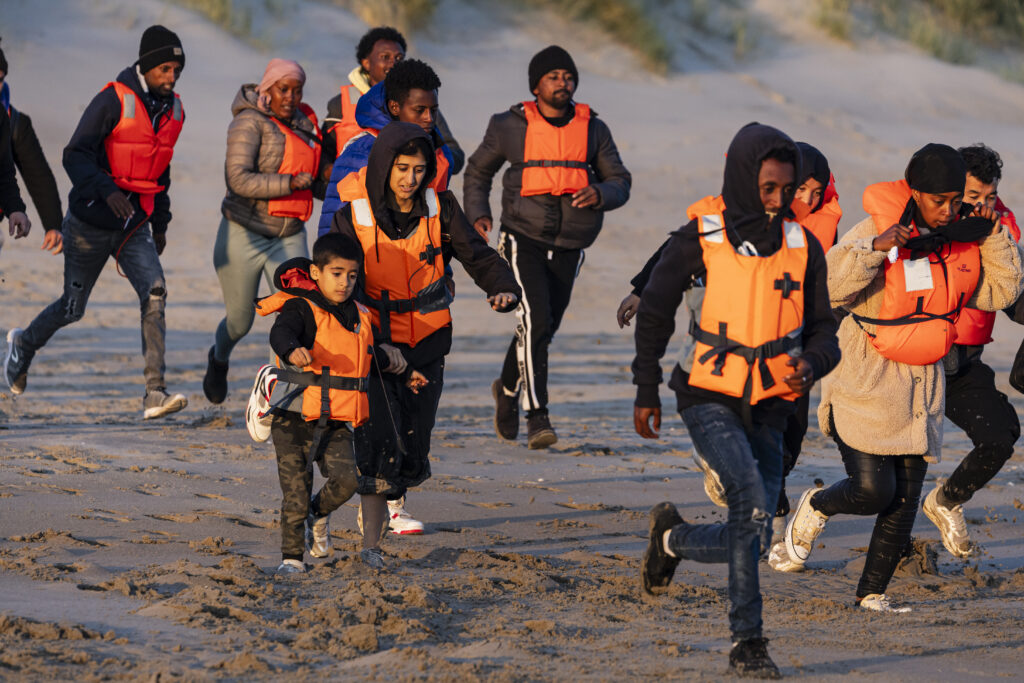As the sun rose over a beach in northern France, migrant men, women and children in orange lifejackets sped along the sand towards the sea under the gaze of French police. Some managed to wade through the water to a dinghy bound for England, but others — deeply disappointed — plodded back into the dunes behind the beach.At least 15 people have died trying to cross the Channel to Britain so far this year, after a record 78 lost their lives attempting the sea crossing last year.Migrants have in recent days been making the most of fair weather to attempt the trip.British authorities said that, on Friday, 919 people landed on its shore after crossing the Channel in 14 small boats.The following day, 134 new migrants arrived, despite a storm warning having been issued for the previous night.As the sun rose over the Gravelines beach on Monday morning, a first group of migrants waited in the water for a boat that never came.They gave up and walked back to the dunes as police officers looked on from various spots along the beach, the towers of a nearby nuclear power plant looming in the background. – Cloud of tear gas -At the same moment a large group of men, women and children — most wearing bright orange life jackets — leapt out from the dunes and rushed forward towards the sea.Police officers fired tear gas, but the migrants emerged from the cloud of bitter smoke and jumped back behind more grass-covered dunes further along the beach.A drone buzzed in the sky, while a plane from European border agency Frontex flew overhead.France and Britain have vowed to crack down on people-smugglers who often charge thousands of euros (dollars) for migrants to cross to England, often on overloaded and unseaworthy boats.To avoid French authorities stopping them on land, smugglers have in recent years increasingly operated so-called “taxi-boats”, pulling up into choppy shallow waters and forcing their passengers to wade in to make it on board.But the waves and overcrowding, combined with the fact many migrants cannot swim, make these boardings particularly dangerous.Far out on the water on Monday, an inflatable dinghy appeared and slowly motored its way into shallow waters.From their hiding spot behind the beach-grass, the migrants saw their ride.With some parents carrying children on their shoulders, the group rushed down to the water a second time and waded in.Some soon had water up to their shoulders, others got out of their depth, and many screamed.Parents tried desperately to board with toddlers, as a French navy rubber dinghy circled nearby ready to intervene.Police officers on the beach had rushed to the edge of the water.- Police posted along beach -Under international law, once migrants are in the water, French authorities are only allowed to intervene to rescue someone in distress.But the French interior ministry said this month they hoped to be able to intervene up to 300 metres offshore to prevent the “taxi-boats” from picking up their passengers.In the end, most of the large group of men, women and children managed to climb onto the boat.Young men found a seat by straddling its inflatable outer tube.But members of a second smaller group who tried to tag along were not so successful.Police stopped two women as they approached the water, each clutching the hand of a young child, one of them crying.The rest of the group, several of whom where Eritrean, soon gave up and headed back to the beach, heads hung low, walking past policemen posted every 20 metres along the sand.According to aid workers more than 1,500 migrants have been staying at the nearby Loon-Plage camp in recent days, waiting for a good time to make their sea journey.More live in the area around the port city of Calais further down the coast.
